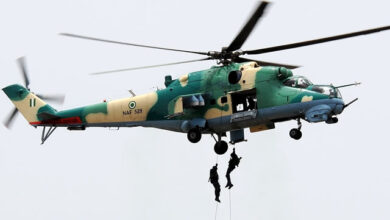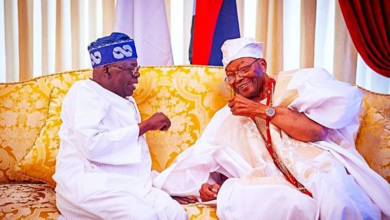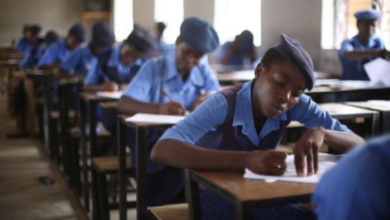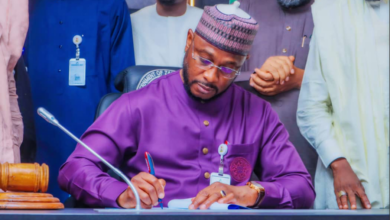Release of Boko Haram terrorists: We are unaware, government insists
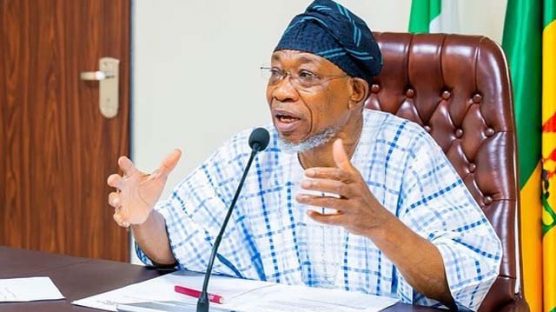
Minister Of Interior, Rauf-Aregbesola
*We Aren’t In a Position To Know What Happened – Ministry Of Interior
- Not On My Desk Yet, Difficult To Comment, Says NCoS PRO
- Giving More Details Will Subject Families To Trauma – Defense Headquarters
- Nigerians Should Hold Govt Accountable, Sue For Breaching Of FOIA – Stan-Labo
By guardian.ng
One week after the discreet release of about 100 Boko Haram terrorists from the Kirikiri medium and maximum security facilities in Lagos, the Nigerian government kept mum and refused to acknowledge there was any such incident.
The prisoners of state were allegedly set free as part of a swap deal for the release of the 23 remaining passengers who were abducted in the Abuja-Kaduna bound train on March 28. But since the release, there have been varied reactions, mostly condemning Federal Government’s action and querying its rationale.
Just as there has been no word from the Ministry of Interior, which supervises the Nigerian Correctional Service (NCOs) nor the Ministry of Information and Culture, the military top brass have also refused to admit the prisoners’ release or give any information regarding the incident.
Disturbed by the deafening silence across the board, The Guardian sought answers to some questions being asked by Nigerians from government officials who ought to know, with a view to ascertaining why the terrorists were released, whether it was indeed part of a swap deal for hostages and why the release was shrouded in secrecy.
While the office of the Minister of Interior said that the custodial centres were in no position to answer the queries of Nigerians, directing that they be sought from the police and the army, the Nigerian Correctional Service (NCOs), in whose care the alleged terror suspects were kept and released, offered little or no explanation either.
Specifically, Sola Fasure, who is the Special Assistant (on media) to the Minister of Interior, Rauf Aregbesola, explained that the information being sought regarding the said release of over 100 Boko Haram terrorists awaiting trial at the Kirikiri prison and related issues, could only be obtained from the police, the Nigeria Aarmy and the office of the National Security Adviser (NSA), who are usually the agencies that bring the terrorists for holding pending their trial and sentencing.
He said: “The custodial centres don’t determine who comes in or goes out. It is not for them to release and detain but for those who come with the warrant. The Police, the NSA or the army are the government agencies to know the answers.”
He explained further: “If it is awaiting trial inmates, it is those who brought the inmates that can take them away, the custodial centres have no business with who takes them out or brings them in and suspects are routinely moved.”
In his response, the NCoS, Public Relations Officer (PRO), Abubakar Umar told The Guardian that he is yet to be briefed on the development.
Responding to a WhatsApp query on the issue one week after, he replied: “Not on my desk yet, as such it’s difficult to comment.”
On his part, the Public Relations Officer (PRO), Lagos Command of the NCoS, Rotimi Oladokun directed our reporter to the national PRO, claiming he was unaware of the development.
Recall that the actual release of the prisoners happened at Kirikiri Prisons, which is under the Lagos Command of NCOs.
Contacted to confirm if indeed, the terrorists were released as part of a swap deal for hostages and also whether there was a monetary exchange before the government could secure the release of the Abuja-Kaduna train passengers, the Defence headquarters insisted that the passengers were rescued through a non-kinetic operation by the Nigerian Armed Forces, in conjunction with security agencies in the country.
Director of Defence Information, Major General Akpor told The Guardian on the telephone that the response of Defence headquarters on the issue in its last Defence Media Operations (DMO) briefing remained its position on the matter.
He, however, disclosed that it would send more reaction on a later date soon. According to him, “We would get back to you soon with our reaction.”
The Director, Defence Media Operation (DMO), Major General Musa Danmadami, had refused to give details on the rescue operations.
Gen Danmadami, while responding to questions from newsmen on how the hostages regained their freedom had said: “Wanting to know details is not the issue for now. The important thing is that these people have been held captive for six months and the Defence Headquarters (DHQ), in collaboration with other security agencies, through the committee that was set up by the President and Commander-in-Chief of the Armed Forces, Muhammadu Buhari, secured their release.
“We already know the trauma that the abductees and their family members went through. Giving you more details will subject them and their families to more trauma.”
Reacting on the issue and how government officials have been dodgy with information or owing up to the release of insurgents, former Army Intelligence Officer, Col. Hassan Stan-Labo (rtd.) said the Minister of Information or the authorities of the Nigeria Prison Service should ideally speak up on the issue.
He decried running a country where the government of the day does not feel citizens are entitled to be briefed on developments regularly. “Things just go on. Those running the administration have turned themselves into the masters, rather than the citizens being the masters. In a democracy, the concept is that power rests with the people. But it is different with this administration and sadly, Nigerians have accepted the position too.”
To change the situation, Stan-Labo said Nigerians must continue to hold the government accountable, including journalists who could sue the government for breaching the Freedom of Information (FOI) Act.
Stan-Labo noted that there are certain government/military actions that could be shrouded in secrecy, he however said Nigeria got to this stage because “we allowed the insurgents to fledge.
“If Nigeria had been proactive from the beginning of the war against terrorists, we would not find ourselves where we are busy negotiating with them because we have to save the lives of innocent Nigerians. Nigeria Army is a force to be reckoned with in terms of operational capabilities. I talk as someone who has been involved in battles; I fought with this military in Liberia, Sierra Leone, Dafur, Bakassi Penisula and other places.”


